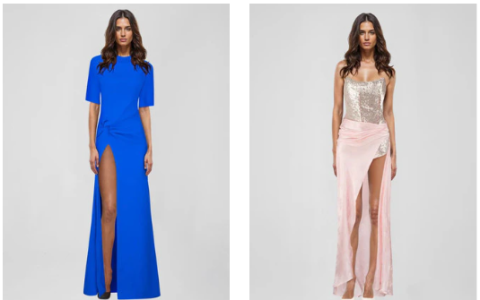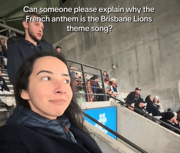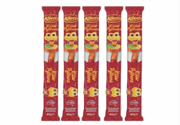Wait…are they really using AI models to sell us clothes?
By
Maan
- Replies 0
Shoppers browsing a popular fashion retailer thought something felt... off.
The clothes looked flawless. The model even more so. But none of it was real.
A Melbourne-based fashion brand was called out online after customers discovered it had used AI-generated models and garments in its listings on The Iconic—without clear upfront disclosure.
An Australian woman spotted the issue and shared it on a popular forum, writing: ‘Saw this on The Iconic. The brand ATOIR is using AI models for their clothing. Feels so deceptive.’
The listing featured two hyper-realistic images of a brunette model wearing a white dress—one front-facing, the other from behind.
Only at the bottom of the product description did Atoir reveal the images were artificially generated.
‘Please note that this eCommerce imagery has been crated (sic) using artificial intelligence technology and does not feature a real model,’ the listing read.
‘These AI generated visuals are designed to represent our products accurately and creatively.’
The Iconic disclosed the use of AI in some product descriptions, but failed to mention it in others—even though the same AI-generated model appeared across multiple listings.
That lack of consistency sparked outrage from shoppers who said the practice was misleading.
‘(A) $400 dress and you can only see an image generated version of it before you buy it,’ one person wrote online.
Others criticised the accuracy of AI images, pointing out they failed to show how the garments actually fit or how different fabrics draped on a real body.
‘AI cannot replicate the way a garment sits on the body, or the way different types of fabric drape,’ one commenter wrote.
‘They might as well just take a flat lay photo of the garment, that would actually be more useful.’
Another added: ‘It’s just a realistic looking line drawing at this point. I can’t say I’m prepared to shell out hundreds of dollars online when I don’t even get to see an actual garment.’
Digital marketing experts said brands were taking a gamble by relying on AI imagery—especially when authenticity was key.
Krishna Chandak, director of Interlunar Media, said AI visuals could ‘often miss the mark’ for fashion, skincare, and wellness brands.
‘Real content consistently outperforms AI-generated content,’ he told NewsWire.
‘Whether it’s user-generated content, branded shoots, or genuine storytelling, the return on investment is almost always stronger with authentic visuals.’
Kevin Heimlich, chief executive of The Ad Firm, warned that retailers were walking an ‘ethical tightrope’ by using AI in product imagery.
‘AI can whip up these incredibly slick, almost perfect images. They look amazing, truly aspirational,’ he said.
‘If that image does not exactly match the real item a customer receives, you have a problem.’
He said customer disappointment could result in product returns—and a loss of trust.
‘When a customer opens their package and sees something that does not quite align with what they saw online, it is a direct path to disappointment, frustration, and often, a return,’ he said.
He also warned of the broader risk to brand integrity.
‘Such damage to a brand’s reputation and consumer trust can take a considerable amount of time to repair, and it undoubtedly impacts future sales,’ he said.
Heimlich encouraged brands to stick with traditional methods—photographers and models who bring emotion and storytelling to life.
‘A skilled photographer, or a model who embodies the essence of your brand, does so much more than show the product,’ he said.
‘AI, in its current form, often struggles to replicate that nuanced human artistry and emotional depth.’
The Iconic and Atoir did not respond to requests for comment.
This isn’t the first time shoppers have raised concerns over misleading tactics used in online retail.
When images or product listings don’t reflect reality, it can chip away at consumer confidence—sometimes with financial consequences.
One recent example highlights how some stores are taking deception to a whole new level.
Read more: Fake closing-down sales by ‘ghost stores’ spark consumer warnings

Would you buy a $400 dress without knowing what it looks like in real life?
The clothes looked flawless. The model even more so. But none of it was real.
A Melbourne-based fashion brand was called out online after customers discovered it had used AI-generated models and garments in its listings on The Iconic—without clear upfront disclosure.
An Australian woman spotted the issue and shared it on a popular forum, writing: ‘Saw this on The Iconic. The brand ATOIR is using AI models for their clothing. Feels so deceptive.’
The listing featured two hyper-realistic images of a brunette model wearing a white dress—one front-facing, the other from behind.
Only at the bottom of the product description did Atoir reveal the images were artificially generated.
‘Please note that this eCommerce imagery has been crated (sic) using artificial intelligence technology and does not feature a real model,’ the listing read.
‘These AI generated visuals are designed to represent our products accurately and creatively.’
The Iconic disclosed the use of AI in some product descriptions, but failed to mention it in others—even though the same AI-generated model appeared across multiple listings.
That lack of consistency sparked outrage from shoppers who said the practice was misleading.
‘(A) $400 dress and you can only see an image generated version of it before you buy it,’ one person wrote online.
Others criticised the accuracy of AI images, pointing out they failed to show how the garments actually fit or how different fabrics draped on a real body.
‘AI cannot replicate the way a garment sits on the body, or the way different types of fabric drape,’ one commenter wrote.
‘They might as well just take a flat lay photo of the garment, that would actually be more useful.’
Another added: ‘It’s just a realistic looking line drawing at this point. I can’t say I’m prepared to shell out hundreds of dollars online when I don’t even get to see an actual garment.’
Digital marketing experts said brands were taking a gamble by relying on AI imagery—especially when authenticity was key.
Krishna Chandak, director of Interlunar Media, said AI visuals could ‘often miss the mark’ for fashion, skincare, and wellness brands.
‘Real content consistently outperforms AI-generated content,’ he told NewsWire.
‘Whether it’s user-generated content, branded shoots, or genuine storytelling, the return on investment is almost always stronger with authentic visuals.’
Kevin Heimlich, chief executive of The Ad Firm, warned that retailers were walking an ‘ethical tightrope’ by using AI in product imagery.
‘AI can whip up these incredibly slick, almost perfect images. They look amazing, truly aspirational,’ he said.
‘If that image does not exactly match the real item a customer receives, you have a problem.’
He said customer disappointment could result in product returns—and a loss of trust.
‘When a customer opens their package and sees something that does not quite align with what they saw online, it is a direct path to disappointment, frustration, and often, a return,’ he said.
He also warned of the broader risk to brand integrity.
‘Such damage to a brand’s reputation and consumer trust can take a considerable amount of time to repair, and it undoubtedly impacts future sales,’ he said.
Heimlich encouraged brands to stick with traditional methods—photographers and models who bring emotion and storytelling to life.
‘A skilled photographer, or a model who embodies the essence of your brand, does so much more than show the product,’ he said.
‘AI, in its current form, often struggles to replicate that nuanced human artistry and emotional depth.’
The Iconic and Atoir did not respond to requests for comment.
This isn’t the first time shoppers have raised concerns over misleading tactics used in online retail.
When images or product listings don’t reflect reality, it can chip away at consumer confidence—sometimes with financial consequences.
One recent example highlights how some stores are taking deception to a whole new level.
Read more: Fake closing-down sales by ‘ghost stores’ spark consumer warnings
Key Takeaways
- Atoir used AI-generated models and garments in listings on The Iconic.
- Some listings disclosed the use of AI—others did not, sparking backlash.
- Experts said AI imagery could harm trust and misrepresent clothing fit.
- Retailers were urged to use real models to preserve authenticity and connection.
Would you buy a $400 dress without knowing what it looks like in real life?








